✓ Joining us on our Whatsapp Channel: 💬 Explore and Escape!.
Booking through us:
✓ 🏩 🛌 Handpicked Luxury Stays in Budget: Booking.com | Agoda.com
✓ 🍹⛱️ Deals on Private xfers, SIM Cards, City tours, Day trips : 📍🗺️ GetYourGuide | 🛵🧳 Klook
If you have done the things to do in South Korea, you’d know there are quite a few of them here in Jeonju.
Nestled in the heart of South Korea’s Jeolla province, Jeonju is a vibrant blend of tradition and modernity.
From exploring ancient Hanok villages to indulging in mouth-watering Korean cuisine, Jeonju offers an array of cultural and gastronomic experiences that are sure to leave a lasting impression.
Without further ado listed below are some of the most fun things to do in Jeonju:
1. Jeonju Hanok Village
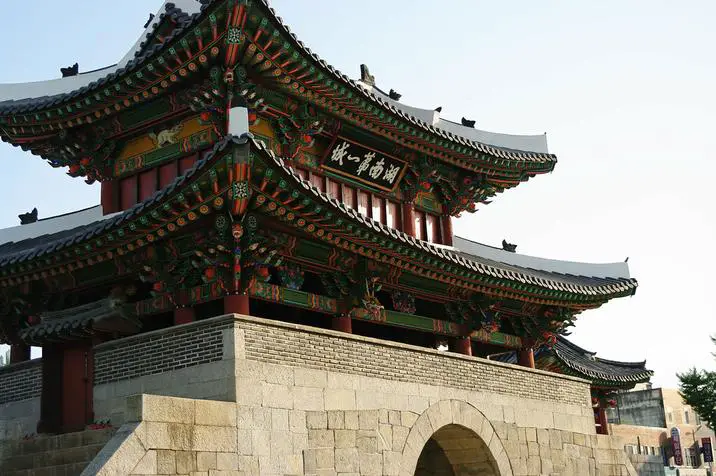
Traditional Korean village in Jeonju, South Korea known for its well-preserved hanok buildings.
What to see or do: Explore the winding alleys lined with traditional houses, visit museums showcasing local culture and art, try a variety of Korean cuisines, attend festivals and performances.
Don’t Miss: Omokdae and Imokdae, two scenic hills offering panoramic views of the city, Jeondong Catholic Church, the oldest Catholic church in Korea, Gyeonggijeon Shrine, a historic site where the portrait of the founder of the Joseon dynasty is enshrined.
Insider travel tips: Try the local delicacy, bibimbap, at one of the many traditional Korean restaurants, visit in the spring when cherry blossoms bloom, and stay overnight in a hanok guesthouse to fully immerse yourself in the traditional Korean experience.
Also, be prepared to walk as most of the alleys in the village are not accessible by car.
2. Gyeonggijeon Shrine
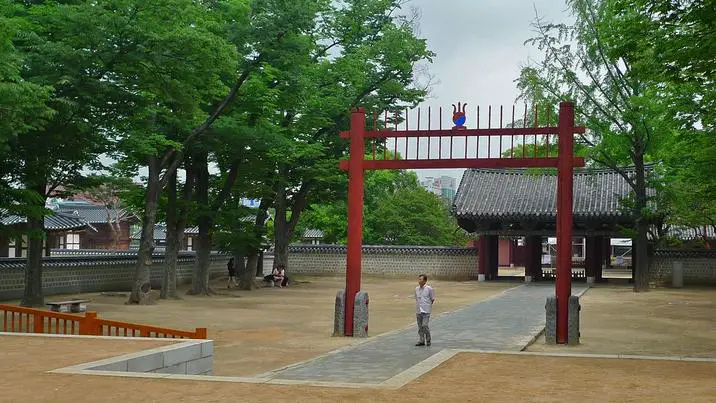
Gyeonggijeon Shrine is a historic Confucian shrine located in Jeonju, South Korea.
What to see or do: Visitors can admire the traditional Korean architectural design of the shrine, which dates back to the 14th century. Inside, there are various artefacts and exhibits related to the Joseon Dynasty, including portraits of its kings.
Don’t miss: The beautiful surrounding gardens and park, which are home to various cherry blossom trees and offer a peaceful escape from the bustling city.
Insider travel tips: It’s recommended to visit the shrine early in the morning to avoid crowds. Also, be sure to check out the nearby Jeonju Hanok Village for a taste of traditional Korean culture and cuisine.
3. Omokdae and Imokdae
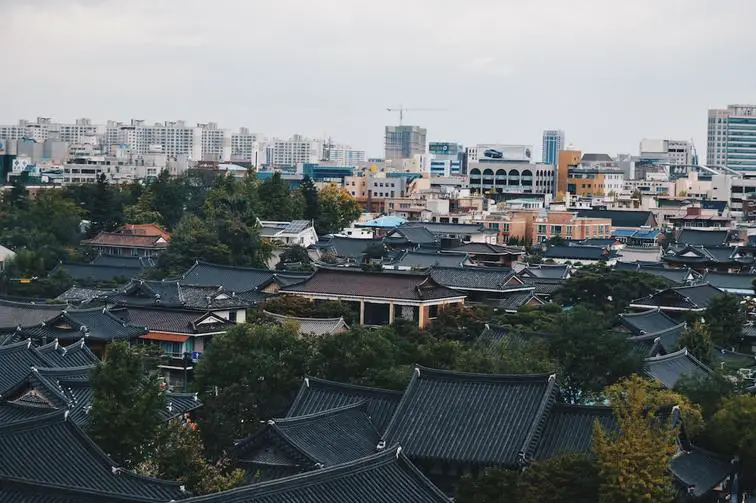
Two hilltops in Jeonju that offer beautiful views of the city.
What to see or do: Visitors can climb up both hills to enjoy stunning panoramic views of Jeonju and its surroundings. The hills are also surrounded by historic sites and traditional buildings, making for a wonderful cultural experience.
Don’t miss: Sunset or sunrise. The view is particularly awe-inspiring during these times.
Insider travel tips: Wear comfortable shoes for the uphill climb and bring water and snacks as there aren’t many vendors nearby. It’s also worth considering visiting in the early morning or late evening when it’s less crowded.
4. Jeondong Catholic Church
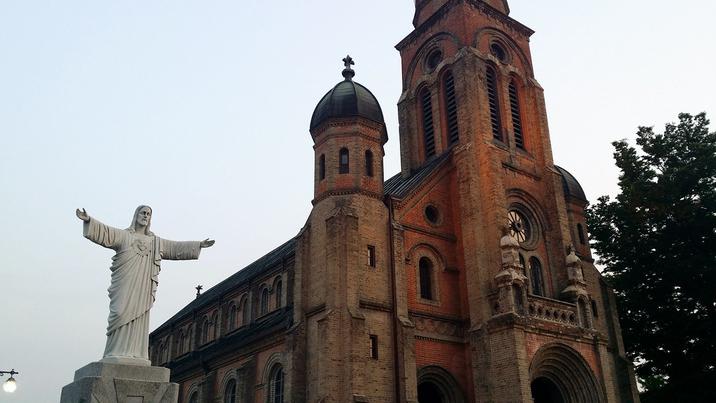
Jeondong Catholic Church is a beautifully preserved Gothic-style cathedral located in Jeonju, South Korea. Built in 1908, it is one of the oldest and most historic churches in the country.
What to see or do: Visitors can admire the impressive architecture of the church, including its stained glass windows and ornate decorations. The interior of the building is also well worth exploring, with detailed frescoes and intricate carvings.
Don’t miss: Make sure to take a walk through the adjacent Jeonju Hanok Village, a charming area of traditional Korean houses and narrow streets.
There are plenty of restaurants, cafes, and souvenir shops to explore.
Insider travel tips: Visitors can attend Mass on Sundays and weekdays, and special events such as concerts and exhibitions are often held in the church.
Arrive early in the day to avoid crowds, and wear comfortable shoes for exploring the surrounding area.
5. Nambu Market
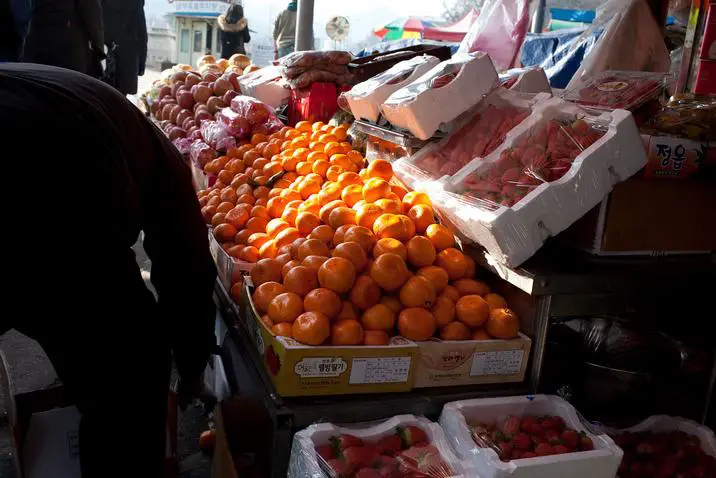
Nambu Market is a popular traditional market in Jeonju, South Korea.
What to see or do: You can explore various sections of the market selling fresh Korean produce, seafood, street food, clothes, ceramics, and souvenirs.
There are also several small restaurants and food stalls where you can taste delicious Korean dishes such as bibimbap, Korean pancakes, and tteokbokki.
Don’t miss: Don’t miss trying the famous Jeonju-style bibimbap at one of the many stalls and restaurants in the market. You can also buy some of the region’s specialty products such as Jeonju Hanji (traditional Korean handmade paper) and tea.
Insider travel tips: Visit the market in the morning to see it at its busiest and most vibrant. Don’t forget to bring cash as most stalls do not accept credit cards.
If you want to buy souvenirs, negotiate with the vendors to get the best price.
6. Jeonju Zoo
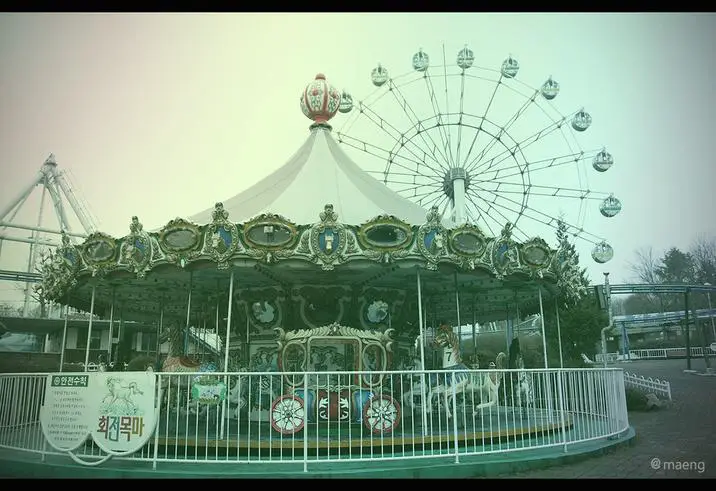
Jeonju Zoo is a popular animal park located in the city of Jeonju in South Korea.
What to see or do: Visitors can explore a wide variety of animals from around the world, including lions, tigers, bears, primates, reptiles, and birds. There is also a petting zoo area where visitors can interact with domestic animals such as sheep, goats, and rabbits.
Don’t miss: Don’t miss the daily animal shows, where visitors can watch the animals perform various tricks and displays of their natural behaviors.
The elephant show and the sea lion show are particularly popular.
Insider travel tips: – Visit the zoo during the weekdays to avoid the crowds that gather during the weekends.
7. Jeonju National Museum
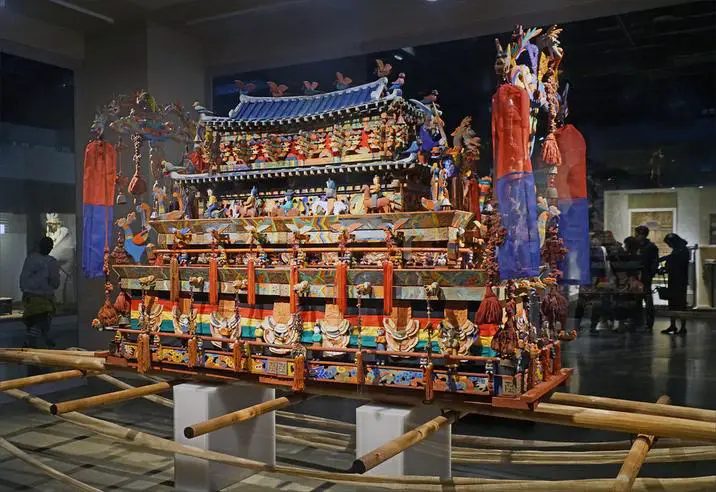
Jeonju National Museum is a national museum located in the city of Jeonju, South Korea. It houses over 20,000 artifacts and relics from the area and its surrounding regions.
What to see or do: Visitors can explore the museum’s collections, which include ancient ceramics, Buddhist sculptures, and textiles. The museum also has outdoor exhibits featuring stone pagodas and sculptures.
Don’t miss: Be sure to see the Jeonjugwan, an iconic cultural property of Korea, and the Jeonju Portrait of Yi Am, a precious cultural heritage of Jeonju.
Insider travel tips: Admission to the museum is free for all visitors, and there are guided tours offered in both Korean and English. The museum is closed on Mondays but is open every other day of the week.
It’s a great place to gain insight into the rich history and culture of Korea.
8. Jeonju Traditional Culture Center
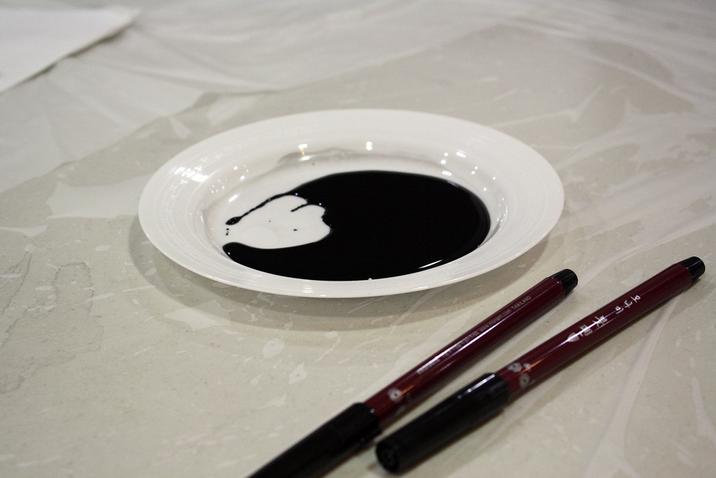
Jeonju Traditional Culture Center is a facility dedicated to preserving, promoting and showcasing the rich cultural heritage of Jeonju, a city renowned for its traditional arts and cuisine.
What to see or do: Visitors can participate in various cultural activities such as making traditional crafts, dressing up in hanbok (traditional Korean clothing), and learning traditional music and dance.
There are also galleries and exhibitions showcasing the city’s history, art, and cultural artifacts.
Don’t miss: The highlight of the center is the Jeonju Hanok Village, a group of traditional Korean houses that have been preserved to offer a glimpse into the city’s past.
Visitors can stroll through the village and experience what life was like in ancient Korea.
Insider travel tips: – Plan your visit during the annual Jeonju International Film Festival, which takes place in May, to catch some of the latest films from around the world.
9. Pungnammun Gate
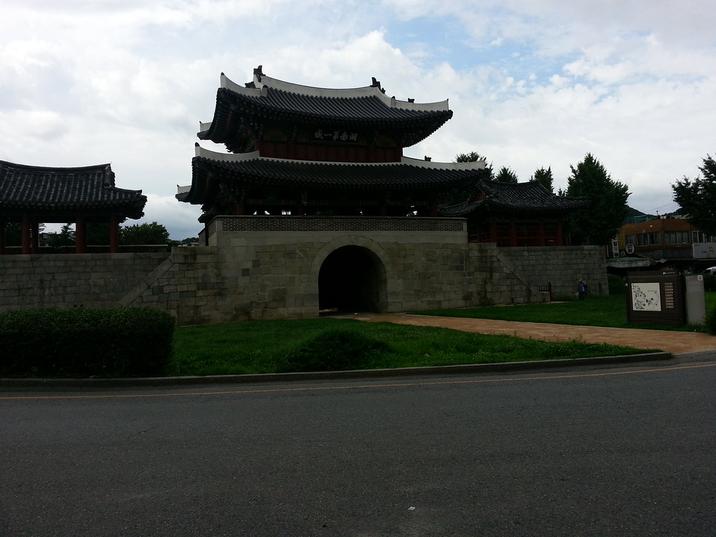
Pungnammun Gate is a historic gate that served as the southern entrance to the old city of Jeonju during the Joseon Dynasty.
What to see or do: Visitors can admire the impressive architecture of the gate, which is a designated National Treasure of Korea. The area surrounding the gate is also a great spot for taking photos and enjoying the tranquil atmosphere.
Don’t miss: Make sure to check out the nearby Jeonju Hanok Village, which is filled with traditional Korean houses and quaint cafes. Also, catch the changing of the guard ceremony that takes place at the gate twice a day.
Insider travel tips: Visit Pungnammun Gate early in the morning or in the evening to avoid crowds and get the best lighting for photos.
If you’re interested in learning more about the history of the area, consider hiring a local guide who can provide in-depth information.
10. Jeonju Korean Traditional Wine Museum
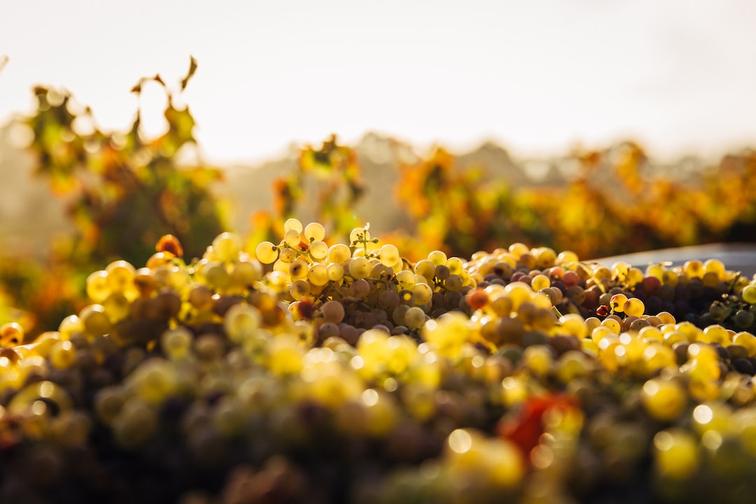
The Jeonju Korean Traditional Wine Museum is a unique museum in Jeonju, South Korea, that showcases the history and cultural significance of traditional Korean alcoholic beverages.
What to see or do: Visitors can learn about the different types of traditional Korean alcoholic beverages such as makgeolli, cheongju, and soju, and their brewing process.
The museum also features various exhibits showcasing the tools and equipment used in brewing Korean traditional wines throughout history.
Don’t miss: Don’t miss the opportunity to try some of the Korean traditional wines in the tasting room, where visitors can sample some of the best beverages made by the local wineries.
Also, make sure to visit the museum shop to purchase some of these exquisite traditional Korean wines as souvenirs.
Insider travel tips: If you are visiting during the summer season, make sure to try the museum’s signature beverage, “Ddongbaegi Makgeolli,” which is served in a traditional Korean earthenware bowl.
Also, taking part in a brewing workshop will give you hands-on experience making traditional Korean wines.
The museum is located in the Hanok Village, a traditional Korean-style village, so take some time to explore the area and savor the local cuisine.
11. Jeonju World Cup Stadium
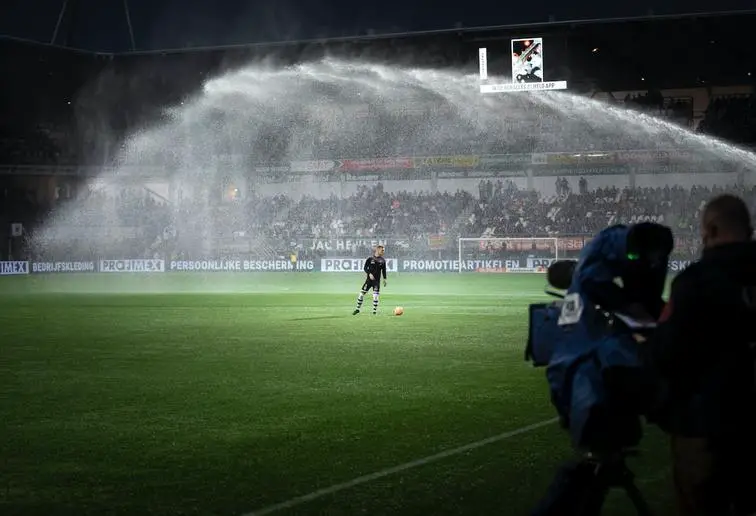
Jeonju World Cup Stadium is a world-class soccer stadium located in the city of Jeonju, South Korea.
What to see or do: The stadium is primarily used for soccer matches and can hold up to 42,477 spectators.
Visitors can take a tour of the stadium and learn about its history and features, including the retractable roof and eco-friendly design.
Don’t miss: If you’re lucky enough to watch a soccer match in the stadium, don’t miss the chance to experience the electric atmosphere as fans cheer on their favorite teams.
Insider travel tips: Be sure to check the schedule for upcoming matches and book your tour or tickets in advance. If you’re traveling to Jeonju during peak season, expect larger crowds and longer wait times for tours and matches.
Additionally, consider taking public transportation to the stadium as parking can be limited on game days.
12. Jeonju Film Festival
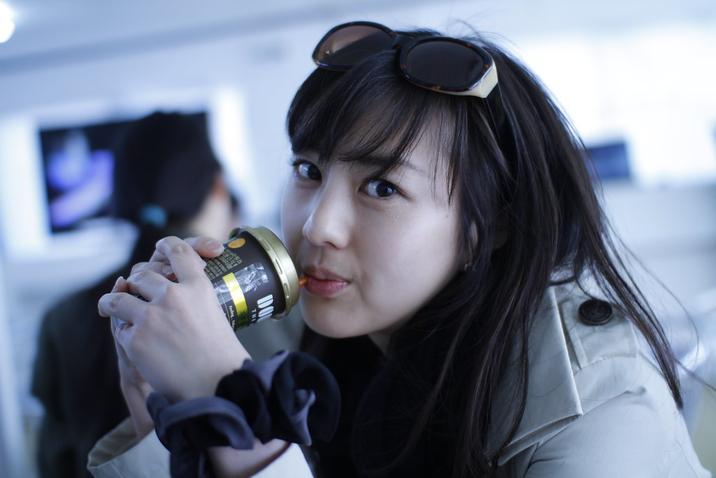
Jeonju Film Festival is one of the most prestigious film festivals in South Korea. It showcases feature films, documentaries, animations, and experimental films from all over the world.
What to see or do: Watch a wide range of films from various genres and countries, attend film seminars, and participate in Q&A sessions with renowned filmmakers.
You can also explore the beautiful city of Jeonju, which is famous for its traditional Korean architecture, delicious food, and cultural events.
Don’t miss: The closing ceremony, which features special awards and a grand finale performance. Also, make sure to check out the outdoor screenings, which offer a unique cinematic experience under the stars.
Insider travel tips: Book your accommodations early, as hotels and guesthouses in Jeonju tend to fill up quickly during the festival. Take advantage of the festival shuttle buses, which run from various parts of the city to the festival venues.
And be sure to try the local cuisine, such as bibimbap and Jeonju hanjeongsik, while you’re in town.
13. Jeonju Zoo Train
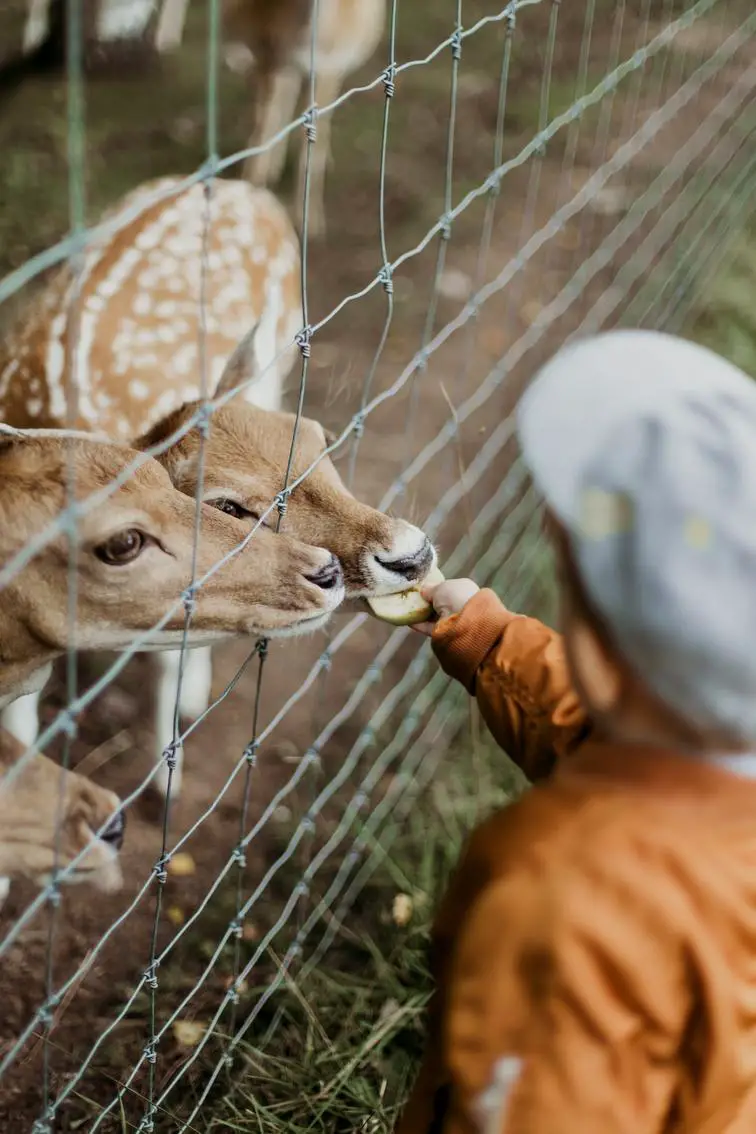
A train ride through the Jeonju Zoo showcasing the various animals and exhibits.
What to see or do: As you ride the train, you’ll be able to see a variety of animals such as lions, tigers, bears, deer, and monkeys.
The train will also pass by exhibits such as a botanical garden and an aquarium.
Don’t miss: The view of the park from the train is stunning. Don’t forget to bring your camera to capture the beautiful scenery.
Insider travel tips: Riding the train is a great way to see the park quickly, but make sure to also spend time walking around and exploring the exhibits on foot.
Also, the train can get crowded on weekends and holidays, so try to visit during weekdays if possible.
14. Gyeonggi Pavilion
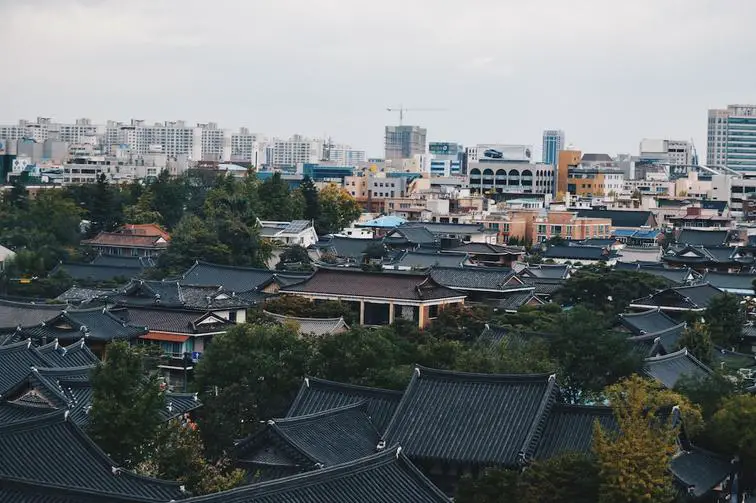
The Gyeonggi Pavilion is a traditional Korean building located in Jeonju Hanok Village.
What to see or do: Take a leisurely stroll around the pavilion and admire the intricate design of the wooden structure. Explore the surrounding area and visit other traditional Korean houses.
Don’t miss: Be sure to admire the beautiful gardens surrounding the pavilion, which change with each season and offer a picturesque backdrop for photos.
Insider travel tips: Visit the pavilion early in the morning or late in the afternoon to avoid crowds and enjoy a peaceful experience. Don’t forget to wear comfortable shoes, as the surrounding area can be quite hilly.
15. Jeonju Hyanggyo Confucian School
Jeonju Hyanggyo Confucian School is a historic educational institution located in Jeonju, South Korea. It was established during the Joseon Dynasty and served as a local school where students could learn Confucian teachings.
What to see or do: Visitors can explore the well-preserved buildings and courtyards of the school, including the lecture hall, study hall, and dormitory. The beautiful architecture and traditional Korean design make for a serene and peaceful atmosphere.
Don’t miss: One of the highlights of a visit to Jeonju Hyanggyo Confucian School is the large stone monument dedicated to Confucius. There are also several smaller shrines and memorials throughout the grounds that are worth seeing.
Insider travel tips: It’s recommended to visit early in the morning or in the evening if you want to avoid crowds. Guided tours are available for a more in-depth experience and understanding of the site’s history and significance.
Additionally, nearby Jeonju Hanok Village offers a glimpse into traditional Korean life and is definitely worth a visit.